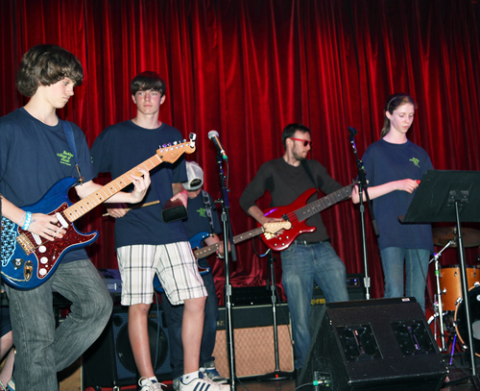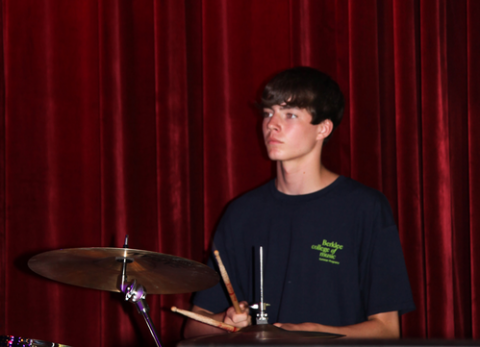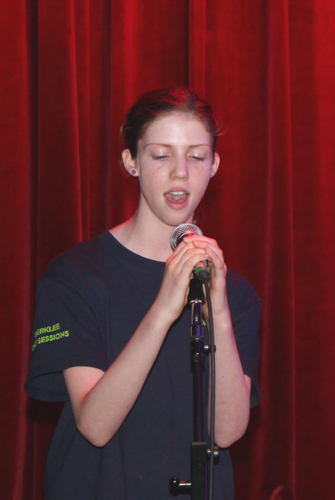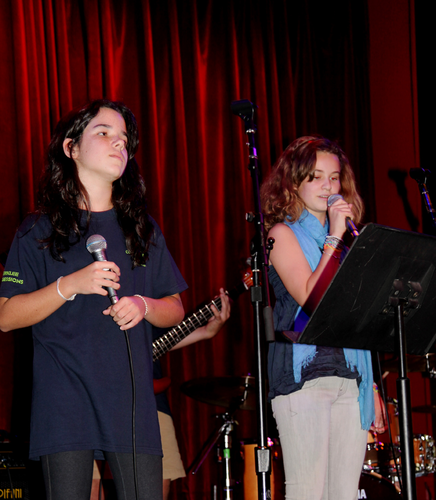Tuneful Tweens

The Day Sessions students rock out on Aretha and Sublime at their week-ending concert.
Photo by Christina Ciaramella

James Mullany, of Weston, Massachusetts, has studied with Berklee alumni.
Photo by Christina Ciaramella

Irish vocalist Siobhan Hegarty has never sung with a band before Day Sessions.
Photo by Christina Ciaramella

Though nonresidential, the program doesn't just attract locals—these singers come from South America and Spain.
Photo by Christina Ciaramella
8 a.m. The grown-ups clutched cups of coffee. The middle-school student screamed on his guitar. Berklee associate professor Skip Smith walked into the practice room and gently laid his hand on the neck of the guitar to quiet it. The musician protested, "I'm playing Judas Priest!"
It might be summer vacation, but the seven kids in the room had no interest in sleeping in. They were too excited to be at Berklee's first-ever program for students too young for the Five-Week Summer Performance Program.
The students simply demanded it. Every year the college "has received numerous phone calls from parents of 12- to 14-year-olds begging to be part of Five-Week," said Darla Hanley, dean of the Professional Education Division. But with rare exceptions, the college has always said no. Five-Week is a residential program, and the college can't house anyone under the age of 15.
So this year Hanley launched Day Sessions with Rob Rose, associate vice president for special programs, as a trial run with minimal fanfare and about 80 students over the course of the four weeks. Each day includes ensembles, small-group lessons, visiting artist clinics, music theory, and a movement class designed to make them feel more comfortable on stage. At the end of each week, the students perform at Cafe 939 for friends and family. Although Day Sessions is modeled on the five-week program, students may participate for as few or many weeks as they want.
Because the program is nonresidential, administrators expected to attract only local students. Not the case: Students have been traveling from as far away as Ireland, Spain, South America, and Barbados, staying with their parents in hotels or with family who live in the area. Hanley described the group as a "wonderfully diverse population of kids who wouldn't have this kind of experience anywhere but Berklee, I think."
Still, despite the demand, there's plenty of supply in the music summer camp market. What sets Day Sessions apart?
Drummer James Mullany, 14, of Weston, Massachusetts, has been to several camps but called Berklee "a step up" from the rest. "The people. . . you can tell they're all professionals at what they do," he said, able to "help you out even if they don't play the same instrument as you." He also thought the equipment was much better, and students spent more time actually playing.
And. . . it's Berklee. "I always heard that Berklee was such a great school," said Mullany, who has taken piano and drum lessons from alumni. "I just wanted to see what it's all about."
In addition, Hanley pointed to the program's unusually flexible ensemble design as a selling point. That week, the program ran a blues-rock guitar group and two pop/r&b ensembles. But the next week the lineup could be totally different. It all depends on the students' interests and abilities. Berklee college students and faculty fill in the gaps in each ensemble to keep the groups whole and solid.
Rehearsing "Santeria" by Sublime, one ensemble certainly didn't sound like a middle-school band. Seven Day Sessions students roared away on lead and harmony vocals, drums, extra percussion, keyboard, and two guitars. Up front, vocalist Siobhan Hegarty, 13, worked out a complicated rhythm with the other singer. Music education major Tim Sweeney held down the bass and coached students as needed. Smith fiddled with the keyboards to get the right sound, then went to check on Mullany, telling him to hold off on the fills he'd learned from the recording. "When you get comfortable you can add some icing," he explained, but first "the groove has to be right there." Mullany nodded and sank into the beat.
"It's amazing. It's such a great school," Hegarty said at lunch in the Berklee cafeteria. She loved the help she was getting with vocal technique. "They tell you what's good warm-ups and how to breathe and how to sing out. . . the teachers pay a lot of attention to you."
Moreover, at home in Ireland she performed in choirs and at piano recitals—but she'd never fronted a rock band. "It'll be a lot of fun but I will be nervous," she admitted. But "it's great. It's so much fun. And it's a good opportunity to get over your nerves."
Hanley saw this kind of vulnerability as an advantage. At this age, students are "impressionable. . . just getting a taste for what music means to them." Berklee's goal is to "help provide space for kids to find their identity as musicians."
Vocal coach Merrily James, a ninth-semester songwriting/music business major, agreed. "It's cool to have this age group here, because I think this is when I seriously started singing," she said. "It's amazing how much improvement there is just in four days." When she was 12, besides, she didn't get to sing with a band. "Who did that?!. . . I sang with my singing teacher."
The sense of comradeship between teacher and student rang out in the practice room. As the other pop/r&b ensemble worked on "I Just Called to Say I Love You," a singer grimaced at the practice recording, asking, "Does my voice really sound like that?" James sympathized: "I used to feel the exact same way," she said. "It's the only way to get better." Then they all listened to the recordings again.
Along with teaching the tweens, Day Sessions is a learning experience for Berklee music education majors, who serve as camp counselors—or, as rising fifth-semester student David Lee joked, border collies. "It's a great chance to see directly and peripherally the real-time issues," Lee said. Fellow collie Andrew Lima had been showing up early to watch the teachers at work, and marveled at the interchange. "To watch George Russell Jr. teach 12-year-olds improvisation!" he said. "Such great techniques. It's really inspiring."
The experience also put them in touch with these kids' realities as aspiring musicians: "How many views you have on YouTube—that's your metric of success and failure," Lee said.
"They won't all go on to music school, but there's tons of research" that kids involved with music do better academically, Hanley said. Whether or not they become Berklee college students, YouTube stars, or even high-school garage rockers, their summer at Berklee will stand them in good stead.
